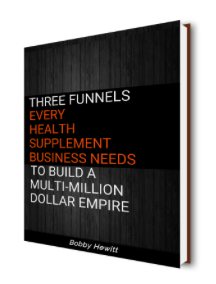The supplement industry is booming, with more and more people looking for ways to support their health and wellness.
As a result, competition among supplement brands is fierce, and standing out can be a challenge.
In a world where there seems to be a supplement for everything, how do some brands manage to stand out from the crowd?
These supplement brands have used a proven strategy to capture their audience’s attention and build a loyal following.
For more information read my comprehensive article on the best supplement marketing strategies that work.
Here are a few of the best examples:
HUM Nutrition
HUM Nutrition is a supplement brand that has gained a loyal following thanks to its focus on social media.
Social media has become an essential part of our lives, and brands have recognized the power of social media influencers in marketing their products.
By partnering with influencers who have a significant following, supplement brands can reach a wider audience and build credibility with their target market.
Brands like HUM Nutrition have leveraged the power of social media influencers to build a loyal following and increase brand awareness.
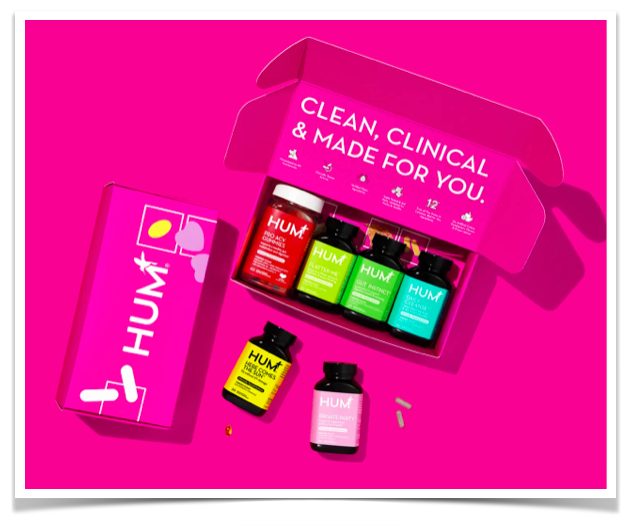
While also taking a stand for the environment.
Every single HUM supplement bottle has specifically designed labels and adhesive that makes them fully recyclable.
So every time you buy a HUM bottle made from Prevented Ocean Plastic™, you prevent the equivalent of 2 plastic water bottles from entering our oceans.
And their boxes are made from SFI + FSC certified materials and printed using 100% wind energy.
But they don’t stop there. Instead of poly plastic mailers, their shipping envelopes are made of post-consumer recycled newspapers. So they are fully compostable and fully recycle able.
In addition to using green wrap, a naturally biodegradable, compostable alternative to bubble wrap.
This stand for sustainability is what sets HUM Nutrition apart from other supplement brands.
Ritual
Ritual offers a daily multivitamin for women that is made with high-quality ingredients and backed by scientific research.
The Ritual supplement brand has made waves due to its marketing strategy of transparency.
What sets Ritual apart is its approach to transparency.
But it’s actually more complex than simple label transparency.
Katerina Markov Schneider the Founder & CEO of Ritual sees her company as rooted in their vision of traceability.
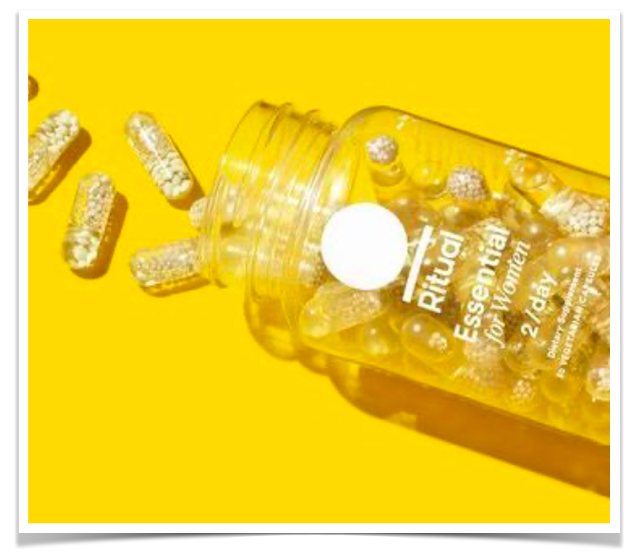
The big marketing insight is that Ritual isn’t selling products, they are selling transparent information.
Katerina Markov Schneider the Founder & CEO of Ritual
This helps them build trust with their customers and stand out in a crowded market.
One of the most significant concerns for supplement users is the lack of transparency when it comes to the ingredients used in their products.
Brands like Ritual have taken this problem head-on and have made transparency a core part of their marketing strategy.
Yes, they provide a complete list of ingredients used in their products, including the exact amounts of each ingredient.
But they also share information about the sourcing and manufacturing of its ingredients, and even provides a breakdown of the cost of each ingredient.
This level of transparency has helped Ritual build trust with their audience, who can make informed decisions about what they are putting into their bodies.
Additionally, Ritual is also focused on environmental impact.
According to a recent announcement…
“Ritual is far ahead of its competitors on the planet-impact curve. But with a goal of net-zero emissions by 2030, and the findings of its recent nine-month quest to become CarbonFree Certified to light the path, the seven-year-old vitamin company is doubling down on its efforts to shrink its already-small footprint.”
Rituals Carbon Free Certification Press Release
Transparency is an extension of environmental impact. Because Rituals “Healthy Skeptic” customers care just as much about the environment as they do their bodies.
Care/Of
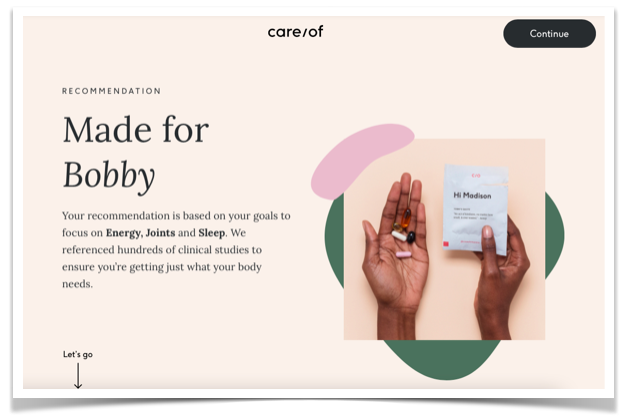
Care/Of is another supplement brand that is changing the marketing game with its focus on personalization.
Care/Of offers personalized supplement protocols. They call it a quiz but it’s more of a personalized product selector that asks customers about their goals, lifestyle, and concerns.
There are different types of quizzes that can be used for marketing supplements. If you want to learn which type is right for your supplement store read the article I wrote about using quizzes in marketing here.
Based on your answers, Care/Of recommends a personalized supplement regimen. Which is why this particular quiz is a product selector and not a traditional quiz.
Their personalized supplement plan approach is based on an individual’s unique needs, lifestyle, and health goals.
This approach has resonated with consumers who are looking for customized solutions that cater to their specific needs.
Care/Of’s product selector “quiz” is very comprehensive with over 50 questions. And it has several really good questions that cover things outside of a list of supplements to take.
Things like your values, and your skeptical level with questions like those below and more.
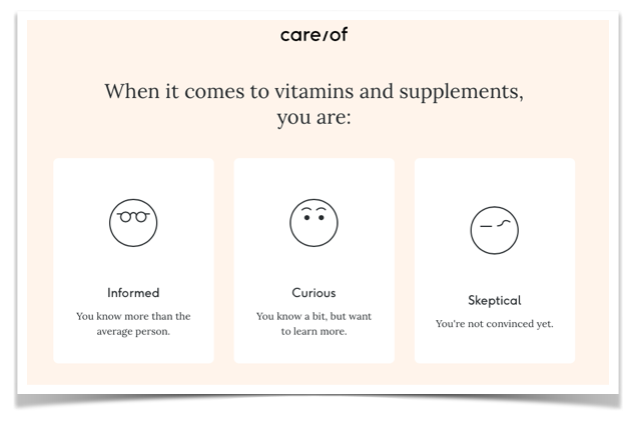
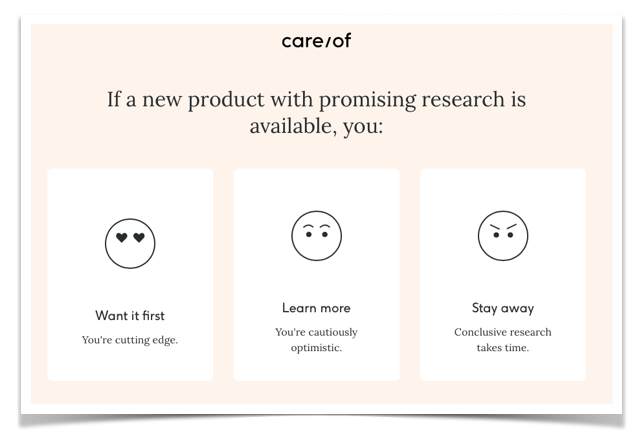
Sadly they don’t leverage your answers to those key questions on the end of their product selector.
They simply give you a custom set of supplements without really using any of the key information like how skeptical you are.
This is key information that can be used to really make the marketing just as unique as the set of supplements and ingredients that re specific to you.
What sets Care/Of apart is its commitment to transparency and sustainability.
The company uses high-quality ingredients and offers detailed information about the sourcing and manufacturing of each supplement.
Plus, Care/Of uses eco-friendly packaging and offers a recycling program for its packaging.
Providing your personalized mix of vitamins in convenient daily packs also makes it easy for their customers to take their products every day.
Quest Nutrition
Quest Nutrition is a prime example of a company that used marketing to catapult itself into the mainstream.
In 2010, the company started out in a small kitchen, but by 2014, it had become the second-fastest-growing private company in America, thanks in large part to its marketing efforts.
Quest Nutrition used social media to its advantage, creating an engaged community of fans who shared their enthusiasm for the company’s products.
The company also leveraged influencer marketing, partnering with fitness personalities to promote its products. Back when th influencer space was wide open.
Quest Nutrition’s “Cheat Clean” campaign was a creative and effective way to promote its protein bars. With marketing tactics like the cheat clean cookbook, with recipes that use Quest products.
The campaign emphasized the idea that consumers can indulge in their favorite treats without sacrificing their health and fitness goals.
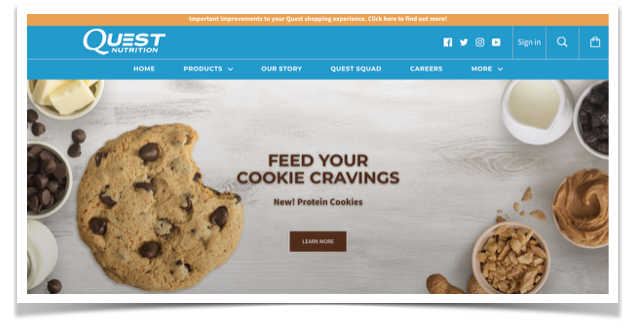
The campaign was a huge success, and it helped Quest Nutrition become one of the top-selling protein bar brands in the world.
Optimum Nutrition
Optimum Nutrition is another supplement company that has seen massive success.
The company’s signature product, Gold Standard Whey, is one of the best-selling protein powders on the market. An industry leader for over 20 years. One of sports nutrition’s legacy brands.
But it’s not just the product that’s driving Optimum Nutrition’s success. The company has also invested heavily in marketing, using social media and influencer marketing to build its brand and engage with customers.
Optimum Nutrition’s “Gold Standard” campaign was a creative and effective way to promote its whey protein supplement.
The campaign featured a gold bar with the Optimum Nutrition logo, and it emphasized the high quality and purity of the supplement.
The campaign was a huge success, and it helped Optimum Nutrition become one of the top-selling supplement brands in the world.
BSN
BSN, or Bio-Engineered Supplements and Nutrition, has also made a name for itself in the supplement industry with its marketing efforts.
The company’s marketing campaigns emphasize the science behind its products, positioning BSN as a trusted source of high-quality supplements.
BSN has also used social media and influencer marketing to build its brand and connect with customers.
The company’s partnerships with top athletes and fitness personalities have helped to further solidify its reputation as a top supplement company.
Thorne
Educating consumers about the benefits of supplements and how they can fit into a healthy lifestyle is essential.
Brands like Thorne Research have made education a cornerstone of their marketing strategy.
They provide extensive resources on their website, including articles, podcasts, and webinars, to help consumers make informed decisions about their health.
These supplement brands are breaking the mold and changing the marketing game with their marketing positioning and focus.
In the competitive world of dietary supplements, it takes more than just a good product to succeed. The best supplement companies have mastered marketing.
Discover the 3 funnels that can help your health supplement business succeed.
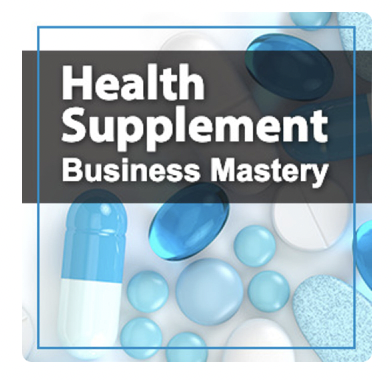
Listen to the Health Supplement Business Mastery Podcast for for dietary supplement entrepreneurs and marketers.
